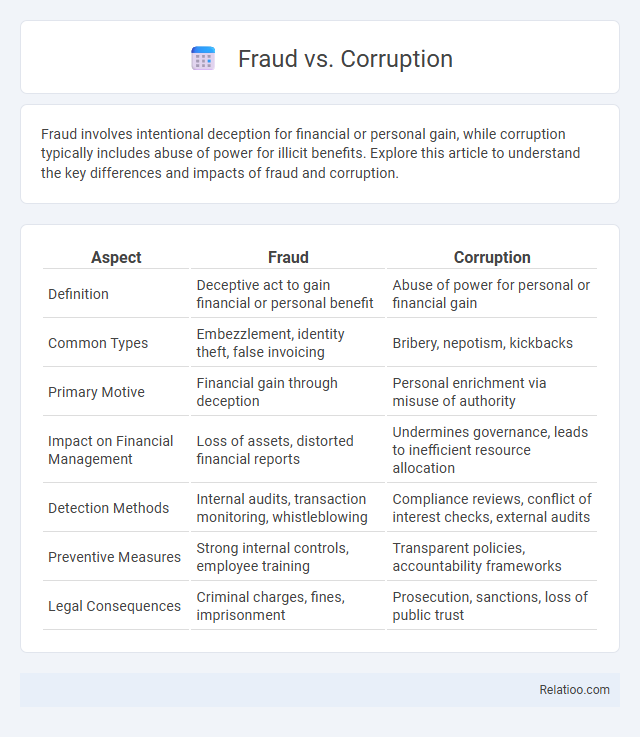Fraud involves intentional deception for financial or personal gain, while corruption typically includes abuse of power for illicit benefits. Explore this article to understand the key differences and impacts of fraud and corruption.
Table of Comparison
| Aspect | Fraud | Corruption |
|---|---|---|
| Definition | Deceptive act to gain financial or personal benefit | Abuse of power for personal or financial gain |
| Common Types | Embezzlement, identity theft, false invoicing | Bribery, nepotism, kickbacks |
| Primary Motive | Financial gain through deception | Personal enrichment via misuse of authority |
| Impact on Financial Management | Loss of assets, distorted financial reports | Undermines governance, leads to inefficient resource allocation |
| Detection Methods | Internal audits, transaction monitoring, whistleblowing | Compliance reviews, conflict of interest checks, external audits |
| Preventive Measures | Strong internal controls, employee training | Transparent policies, accountability frameworks |
| Legal Consequences | Criminal charges, fines, imprisonment | Prosecution, sanctions, loss of public trust |
Introduction to Fraud and Corruption
Fraud involves deliberate deception to secure unfair or unlawful financial gain, while corruption typically entails the abuse of entrusted power for private benefit. Understanding the distinction is vital for your organization's risk management and compliance strategies. Both fraud and corruption undermine trust, harm reputations, and result in significant financial losses globally.
Defining Fraud: Key Characteristics
Fraud involves intentional deception to secure unfair or unlawful gain, characterized by false representation, concealment of material facts, and victim reliance on the deceit. Unlike corruption, which centers on the abuse of entrusted power for private benefit, fraud specifically targets financial or personal advantage through misrepresentation. Your awareness of these defining traits helps in distinguishing fraud and implementing effective prevention strategies.
Understanding Corruption: Core Elements
Understanding corruption involves recognizing key elements such as abuse of entrusted power, intent to gain personal or organizational benefit, and actions that undermine integrity and accountability within institutions. Corruption typically manifests through bribery, embezzlement, nepotism, and favoritism, fundamentally eroding trust and fairness. Differentiating corruption from fraud requires identifying corruption's broader systemic impact, while fraud centers primarily on deceptive practices for financial gain.
Types of Fraud in Organizations
Types of fraud in organizations include asset misappropriation, financial statement fraud, and corruption-related schemes such as bribery and kickbacks. Asset misappropriation involves employees stealing or misusing company resources, while financial statement fraud manipulates accounting data to present false financial health. You must implement robust internal controls to detect and prevent these fraudulent activities, safeguarding your organization's integrity and assets.
Common Forms of Corruption
Common forms of corruption include bribery, embezzlement, nepotism, and fraud, each involving the abuse of power for personal gain. Fraud typically involves deception to secure unlawful financial or personal benefits, while corruption broadly covers unethical behaviors that distort trust and fairness in institutions. Understanding these distinctions helps you identify and combat the various corrupt practices undermining organizational integrity.
Fraud vs Corruption: Major Differences
Fraud involves deliberate deception to secure unfair or unlawful gain, typically affecting individuals or organizations through false representation or concealment of information. Corruption refers to the abuse of entrusted power for private benefit, often manifesting in bribery, nepotism, or embezzlement, primarily within public or corporate sectors. The major difference lies in fraud focusing on deceit for financial gain, whereas corruption centers on power misuse for personal advantage.
Legal Implications: Fraud and Corruption Laws
Legal implications of fraud and corruption differ, with fraud primarily involving intentional deception for financial gain, violating laws such as the Fraud Act 2006, leading to penalties including fines and imprisonment. Corruption, defined as the abuse of entrusted power for personal benefit, breaches statutes like the Bribery Act 2010, resulting in severe criminal charges and corporate sanctions. Understanding Your legal responsibilities under these frameworks is crucial to ensuring compliance and avoiding substantial legal consequences in both public and private sectors.
Impact on Businesses and Society
Fraud undermines business integrity by causing financial losses and eroding customer trust, while corruption distorts fair competition and weakens institutional frameworks, harming economic development and social equity. Businesses suffering from these offenses face reduced investor confidence, increased regulatory scrutiny, and higher operational costs. Your proactive measures in detecting and preventing fraud and corruption are essential for safeguarding economic stability and promoting ethical business practices in society.
Strategies to Prevent Fraud and Corruption
Implementing comprehensive fraud risk assessments and establishing strong internal controls are critical strategies to prevent fraud and corruption effectively. Employee training programs on ethical behavior and whistleblower protection mechanisms enhance organizational transparency and accountability. Continuous monitoring through data analytics and external audits helps detect irregularities early, minimizing financial and reputational damage.
Conclusion: Building Integrity and Accountability
Building integrity and accountability requires a comprehensive approach that differentiates fraud, corruption, and collusion while addressing their root causes through transparent policies and robust enforcement mechanisms. Implementing effective whistleblower protections, regular audits, and ethics training fosters a culture of honesty and deters unethical behavior. Strengthening institutional frameworks and promoting corporate governance ensures long-term resilience against fraud, corruption, and collusion in organizations.

Infographic: Fraud vs Corruption
 relatioo.com
relatioo.com